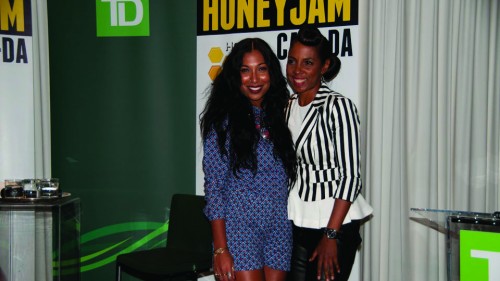Only 30 minutes or so after meeting one another, this year’s Honey Jam line-up of stunning, young female artists is on stage at the launch of the 19th annual event, serenading an audience of industry elite with the sounds of “4 A.M.” and “Give To Me Right”, hit records of Melanie Fiona’s. The two-time Grammy-award winning artist, who was born and raised in Canada, happens to be standing in the back, while her mom and dad sit front row, capturing the entire performance via smart phone.
“That was awesome, so unexpected, what a nice surprise,” says Melanie, as she approaches the front of the room to greet the young women she’s about to do a special Q&A with, beaming with pride. What a welcome home.
For almost two decades Honey Jam has been a stage for all-female talent that has featured notable names like Nelly Furtado, Jully Black and Michie Mee in the early stages of their careers. In fact, about 10 years ago Melanie herself graced its stage, as a backup singer for another LA-based, Toronto native Andreena (as teenagers the two had been in a group called X-Quisite with Nicole Holness).
The kick-off to this year’s Honey Jam, which includes artist development workshops and training, as well as the culminating showcase August 14, proves that as its 20th birthday creeps closer, the passion project of founder Ebonnie Rowe has not lost its appeal.
“When I got into Honey Jam I was amazed, I felt it was unbelievable, just the experience, what I read about Honey Jam, what Honey Jam represents mainly stuck with me, and to be a part of that is incredible,” says Maranda Thomas, a 17-year-old blues/soul singer who is announced as one of the Honey Jammers this year.
Part of the Honey Jam experience, which Thomas refers to, includes an hour and a half in-depth conversation with Melanie Fiona. During the discussion the Roc Nation managed singer, who has toured the world with everyone from Alicia Keys to Kanye West, shares everything from her identity crisis struggles as a teenager to how she feels when people in the music business only want to view her as a sex object or dollar sign. Her main pieces of advice to the young singers coming up after her: sing your truth, know the power of your music, understand you will have to make a lot of sacrifices (and so will those closest to you) and find a team you can trust (she likens this to being in a relationship – you have to kiss some frogs before you find prince charming). Intuition is the greatest gift, Melanie says. “If it doesn’t feel right, don’t do it.”
“[Melanie] showed me that no matter how big of an artist you become it still matters to be humble, it still matters to be thoughtful, it still matters to be giving,” says 23-year-old Rosie Monday, who describes herself as an artist who puts words on beats. “Seeing the type of person she is even after having two Grammys and travelling all over the world, it just showed me that no matter how big of an artist you become, it’s important to stay grounded.”
Grounded is the only way Melanie Fiona knows how to be. Watching as her only entourage – mom and dad – sits front row, smiling, clapping and sharing in her success, it is clear why she is who she is.
“I’ve always told her to be a good example, and that’s one of the reasons why she wouldn’t let people put her in a box,” says her mother, Donna Hallim. “She talked about being a sex object, that’s something I absolutely would not condone and I think she built off of that. I’ve always said to her, celebrities do not realize the influence they have on young people.”
Melanie’s humble, grounded nature is actually what piqued Rowe’s interest in the singer and made her tirelessly pursue booking her as the special guest for this year’s launch. It is the same trait that has Fiona taking hundreds of photographs and signing CDs after the talk is over. She doesn’t budge to leave the room until she speaks with every single young artist (and parent) who is lined up to personally meet her.
“Before I’m Canadian, I’m West Indian and I came from parents who left Guyana and they left a life and built a life so that I could be sitting here and do this,” she explains. “I’m not a stranger to seeing hard work, I’m not a stranger to seeing sacrifice. My parents built such a great foundation for me that I could never get too big for my britches.”
Words By. Priya Ramanujam + Photos By. Lee Hon Bong




Comments are closed.